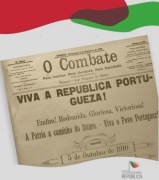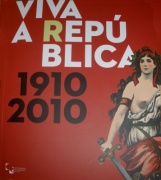 On February 1st 1908, the king Carlos I of Portugal and his heir apparent, Prince Luis Filipe, were murdered in Lisbon. In 1910, a revolution deposed the Portuguese monarchy and its last King, Manuel II, giving place to the democratic (but unstable) First Republic (“Primeira República”) , which submersed the country in social chaos and economic problems that were aggravated by the military intervention in World War I. This led to a military coup d’état in 1926, which in turn led to the establishment of the right-wing dictatorship of the “Estado Novo” (New Government), also known as the Second Republic, under António de Oliveira Salazar.
On February 1st 1908, the king Carlos I of Portugal and his heir apparent, Prince Luis Filipe, were murdered in Lisbon. In 1910, a revolution deposed the Portuguese monarchy and its last King, Manuel II, giving place to the democratic (but unstable) First Republic (“Primeira República”) , which submersed the country in social chaos and economic problems that were aggravated by the military intervention in World War I. This led to a military coup d’état in 1926, which in turn led to the establishment of the right-wing dictatorship of the “Estado Novo” (New Government), also known as the Second Republic, under António de Oliveira Salazar.
Portugal was one of only five European countries to remain neutral in World War II.
Portugal is a sovereign Republic, that is based upon the dignity of the human person and the will of the people and is committed to building a free and just society united in its common purposes.
Constitution of the Portuguese Republic – Article 1
The Portuguese Third Republic, which corresponds to the current democratic regime, was installed after the Carnation Revolution (“Revolução dos Cravos”) of April 25th 1974, that put an end to the paternal autocrat regime of Estado Novo of António de Oliveira Salazar and Marcello Caetano. It was initially characterized by constant instability and was threatened by the possibility of a civil war during the early post-revolutionary years. A new constitution was drafted, censorship was prohibited, free speech declared, political prisoners were released and major Estado Novo institutions were closed. Eventually the country granted independence to its African colonies and begun a process of democratization that led to the accession of Portugal to the EEC (today’s European Union) in 1986.
Much has been attained by Portugal to entitle it to celebrate the Centennial of the Republic, and great progress has  been achieved, especially since adhering to the European Union in 1986. Now for the future, a lot of challenges in terms of economic order are already emerging in the horizon and the people of Portugal will be put to test to show what they are made of. This will enable them to show once again their ingenuity and put their resourcefulness to work in preparation for the rough waters ahead and against the strong economic currents that prevail in today’s market.
been achieved, especially since adhering to the European Union in 1986. Now for the future, a lot of challenges in terms of economic order are already emerging in the horizon and the people of Portugal will be put to test to show what they are made of. This will enable them to show once again their ingenuity and put their resourcefulness to work in preparation for the rough waters ahead and against the strong economic currents that prevail in today’s market.
Source: Wikipedia.org
